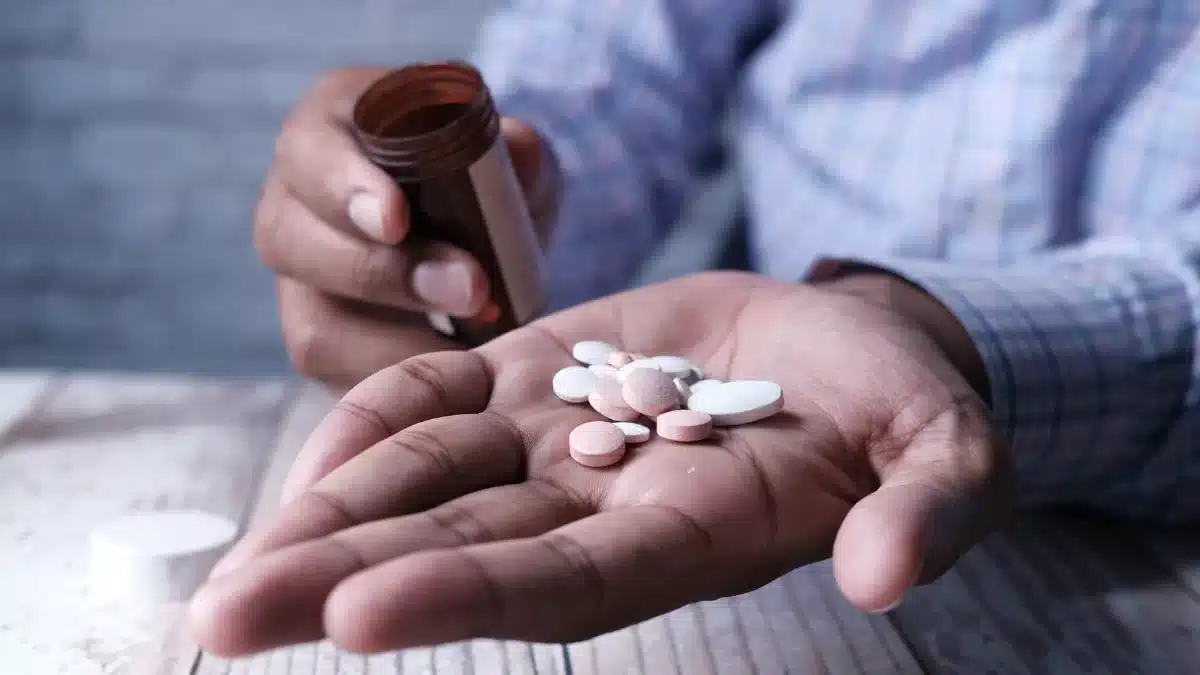Unveiling the Culprits: Drugs That Cause Erectile Dysfunction
Erectile Dysfunction, commonly abbreviated as ED, is a prevalent issue impacting a substantial portion of men in the world.
While various factors can contribute to ED, one often overlooked aspect is the role of medications.
Several commonly prescribed drugs have been associated with the onset or exacerbation of this condition.
Understanding these medication-induced implications is crucial for individuals experiencing ED to seek appropriate medical guidance and explore potential alternatives to mitigate this condition.
In this article, we explore the drugs that cause Erectile Dysfunction and offer insights into how you can address this concern.
Drugs that cause Erectile Dysfunction
Understanding the impact of certain medications on sexual health is crucial for making informed choices about your healthcare.
Here are some classes of drugs that cause Erectile Dysfunction.
Antidepressants
- Selective Serotonin Reuptake Inhibitors (SSRIs):Medications such as Fluoxetine and Sertraline are frequently prescribed to treat depression and anxiety. They operate by elevating Serotonin levels, which may adversely affect sexual desire and function
- Tricyclic Antidepressants (TCAs): Older-generation antidepressants like amitriptyline and Imipramine can also contribute to sexual dysfunction due to their impact on neurotransmitters
Antipsychotics
Drugs used to manage conditions like Schizophrenia and Bipolar Disorder, such as Risperidone and Haloperidol, can lead to sexual dysfunction.
They affect Dopamine and Serotonin levels in the brain, which can disrupt normal sexual function.

Beta-blockers
Beta-blockers are often prescribed for heart conditions and high blood pressure.
These drugs function by inhibiting the actions of Adrenaline, potentially causing a decrease in blood flow to the penis, resulting in increased difficulty in attaining and sustaining an erection.
Antihypertensives
Various classes of blood pressure medications can contribute to Erectile Dysfunction.
This includes diuretics, which reduce fluid volume and blood pressure, ACE inhibitors, which relax and open up blood vessels, and calcium channel blockers, which relax and widen arteries.
Antihistamines

Some over-the-counter and prescription Antihistamines, such as Diphenhydramine, can also cause Erectile Dysfunction.
These drugs can interfere with neurotransmission and blood flow, affecting sexual function.
5-Alpha Reductase Inhibitors
Drugs like Finasteride and Dutasteride are used to treat conditions like enlarged prostate.
While they can be effective for their intended purpose, they may also lead to sexual side effects, including Erectile Dysfunction.
Opioids
Prescription painkillers like Oxycodone, Hydrocodone, and Morphine can interfere with hormonal pathways and neurotransmitters, leading to sexual dysfunction.
Anti-anxiety medications
Drugs like Benzodiazepines (e.g., diazepam, lorazepam) used to manage anxiety disorders can also contribute to sexual dysfunction, including erectile problems.
Hormonal medications
Some medications that manipulate hormone levels, such as certain types of hormonal therapy for prostate cancer, can lead to Erectile Dysfunction.
Chemotherapy drugs
Some chemotherapy drugs can cause hormonal changes.
These changes are known to cause sexual dysfunction, including erectile problems.
They can provide guidance on potential alternatives or adjustments to your treatment plan.
Preventing and managing drugs that cause Erectile Dysfunction

Being proactive about your sexual health can significantly impact your overall well-being.
Here are some steps you can take:
- Open communication: Discuss any concerns about Erectile Dysfunction with your healthcare provider, including any medications you’re currently taking
- Medication adjustment: In some cases, your healthcare provider may adjust your medication regimen or explore alternative options that have a lower likelihood of causing ED
- Lifestyle changes: Engaging in regular exercise, adhering to a well-balanced diet, effectively managing stress, and abstaining from smoking and excessive alcohol consumption all play vital roles in promoting optimal sexual health
- Psychological support: Seeking counseling or therapy can be beneficial for individuals experiencing emotional distress related to Erectile Dysfunction
Gain a better understanding of the treatment options. Read Navigating Effective Erectile Dysfunction Treatment Options.
Conclusion
Erectile Dysfunction (ED) is a prevalent condition with various physical and psychological factors contributing to it.
One often overlooked factor is the impact of medications.
Approximately 10% of men aged 40-70 experience ED, affecting mood, relationships, and quality of life.
Some common drugs linked to ED include antidepressants, antipsychotics, beta-blockers, antihypertensives, and antihistamines.
Additionally, 5-Alpha Reductase Inhibitors, opioids, anti-anxiety medications, hormonal medications, and chemotherapy drugs are also known to have potential effects on ED.
However, not everyone will experience ED as a side effect of these medications, and individual reactions might vary.
Open communication with healthcare providers, medication adjustments, lifestyle changes, and psychological support can help address and manage this concern effectively.
Frequently Asked Questions
Can over-the-counter medications cause Erectile Dysfunction?
While the majority of non-prescription drugs seldom lead to Erectile Dysfunction (ED), certain supplements or herbal treatments could pose such a risk. As for medications that can cause ED, certain prescription drugs, including some antidepressants, antihypertensives, and medications for prostate issues, may contribute to this condition.
Are there medications that can counteract drug-induced ED?
Some medications, such as Phosphodiesterase type 5 (PDE5) inhibitors like Sildenafil (Viagra) or Tadalafil (Cialis), can be prescribed to help manage ED symptoms. However, their use should be discussed with a healthcare provider.
Can lifestyle changes improve Erectile Dysfunction?
Yes, adopting a healthy lifestyle can have a positive impact on sexual health. Ensuring erectile function can be supported by incorporating regular physical activity, maintaining a well-balanced diet, effectively managing stress, and refraining from smoking and excessive alcohol consumption.
Are there alternative treatments for Erectile Dysfunction?
Yes, there are various alternative treatments available for Erectile Dysfunction, including vacuum erection devices, penile implants, and therapy for psychological factors contributing to ED. Discuss these options with your healthcare provider for a more comprehensive understanding of your choices.
WowRx uses only high-quality sources while writing our articles. Please read our content information policy to know more about how we keep our content reliable and trustworthy.






